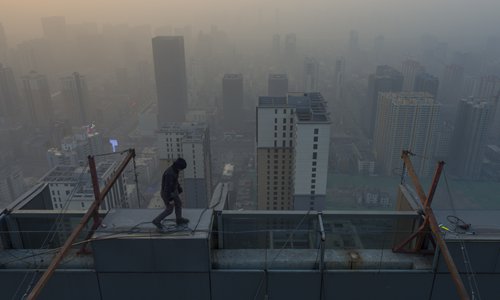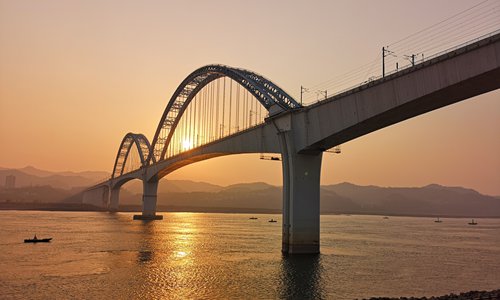It was a less colorful and much quieter Spring Festival this year in Yichang, a town situated by China's greatest river that was once home to an ancient civilization.

Taiyuan, the capital of North China's Shanxi Province, after being hit by heavy smog for several days (Photo: VCG)
Years ago, a major part of Chinese New Year celebrations in my hometown was setting off firecrackers, which would light up both sides of the Yangtze River. There was romantic nighttime entertainment in the form of firework cruises to the Three Gorges, the world's largest hydropower project, which is about 36 kilometers from the city, during the Spring Festival holidays.
My whole family gathered at my grandparents' house during the traditional festival, which is also the most important time of the year when families reunite. The house is a five-minute walk from the Yangtze River, and taking a half-hour walk along the river bank after dinner was my daily routine with my grandparents, who are almost 90 years old.
Change in the air
Today, it is impossible to see anyone preparing for firework displays along the river. People are becoming more concerned about the air pollution caused by fireworks, which have been banned by the local government since 2015 as part of efforts to protect the environment. Some relatives and friends gathering for the holidays told me that Yichang now aims to become a garden city, and they take to heart the saying: "clear waters and lush mountains are as valuable as gold and silver."
Like most third- and fourth-tier cities that have seen rapid urbanization, Yichang has seen its local economy boom in recent years, making it the second-largest economy in Central China's Hubei Province. Many factories, particularly in the chemical industry, are major contributors to the local GDP.
One of my relatives works in a local chemical factory built along the Yangtze River. He said that he could feel the determination of local authorities to protect the river through cutting industrial pollution. Over the past year, the factory has invested in planting more trees around the plant, turning it into a "green manufacturing line."
Also, a major campaign was launched last year to get chemical plants to pull back to at least 100 meters from the river. Some factories that were unable to meet the stricter environmental protection requirements have been shut down, he told me at a family tea party during the holidays.
The plan is also in line with provincial guidelines urging all chemical factories within one kilometer of the Yangtze River to be upgraded to meet environmental protection standards or move away by the end of 2020, according to media reports. In the first half of 2018, local authorities in Hubei issued a total of 126 million yuan ($18.6 million) in fines related to pollution.

Sunset along the Yangtze River in Yichang, Central China's Hubei Province (Photo: GT)
Mother River
Binjiang Park, one of my favorite places in my hometown and which is filled with childhood memories, lies along the Yangtze River. Flying kites in the park is also another ritual for my family. On sunny days, we can see a crystal clear river, in contrast to the muddy water of years ago. My grandparents, who have spent almost their entire lives alongside the Yangtze River, understand all too well how important the plan to protect the "Mother River" is.
"We saw finless porpoises coming back last summer," my grandfather told me. The dolphin-like creature is also a critically endangered species, and has been disappearing from the Yangtze River in recent years. The number of finless porpoises has also declined dramatically due to disruptions to the ecological environment such as water pollution and project construction.
The return of the finless porpoise signals the continuous improvement of the environment. The stunning beauty of the longest river in Asia has inspired countless Chinese poets and painters. And these continuous efforts to protect her will make what my father always wanted to call "La Seine of China" even more beautiful.


